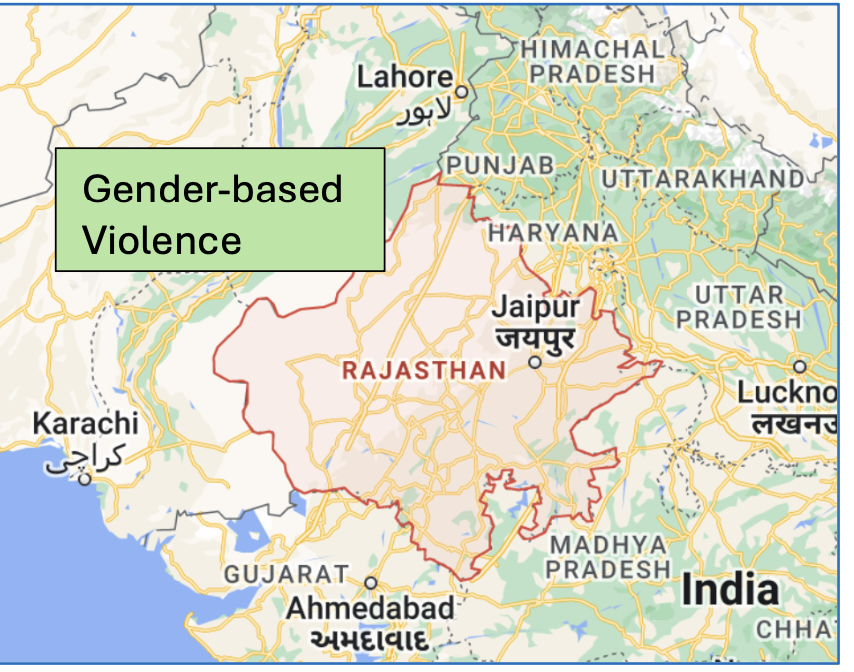 August 6, 2024: PTF’s supported project – Building a Coordinated Response to Prevent and Reduce Gender-Based Violence (GBV) in Kishangarh Block, Ajmer, Rajasthan, India – has been completed with notable successes providing a model for future approaches.
August 6, 2024: PTF’s supported project – Building a Coordinated Response to Prevent and Reduce Gender-Based Violence (GBV) in Kishangarh Block, Ajmer, Rajasthan, India – has been completed with notable successes providing a model for future approaches.
The project, approved in 2018, implemented in two phases, and completed in 2023 (after a Covid-related hiatus), was co-financed by the India Development and Relief Fund (IDRF) and implemented by the Centre for Advocacy and Research (CfAR), an Indian NGO.
PTF applied its traditional approach: diagnosis, a local partner, advocacy, awareness-raising, and constructive engagement with local government. The project was a pilot covering 10 (out of 33) Gram Panchayats (village councils) in Kishangarh Block.
In sum, successes achieved in the project included:
- over 90% of the women are now aware of their legal rights and better understand the services available to them.
- the Women’s Forum leads discussions among women in the community and has secured better infrastructure (48 new street lights and security cameras in market places) and pledges from transport companies to improve security in their vehicles.
- Gram Sakhis, now recognized by local authorities as ‘Suraksha (security) Buddies’, walk confidently into government offices, accompanying the women and girls who need assistance.
- the local government in the project area has begun to allocate budget for CCTVs, better lighting and better policing in public spaces.
- helplines for GBV victims have been set up and a mobile-phone safety App called SpeakUp provides immediate access to the police, the Women’s Forum and/or the family, as also to the redressal mechanisms that have been created.
- as an unintended bonus, there is greater readiness among the women to access non-GBV-related public services, such as livelihood and microcredit programs.
Although the project was located in a small area in Rajasthan, it attracted wider attention in July 2023 when the Hindustan Times, a leading national newspaper, carried an article highlighting its success. It noted that: “Change can be effected when women come together to put up a joint front.”
Building on success
Building on the achievements of the first two phases, PTF and IDRF are now supporting CfAR’s efforts for a third phase: “Institutionalizing Gender-Based Violence (GBV) Prevention and Reduction – Programmatic intervention at the sub-national level within the jurisdiction of Panchayats Samiti, Kishangarh Block, Ajmer District, Rajasthan”. The project will (i) ensure sustainability of the project facilities, (ii) extend them to the other 23 Gram Panchayats of Kishangarh Block, and (iii) improve women’s access to livelihoods. CfAR will also promote this project framework as a model for other parts of Rajasthan. They are examining the safety and security of women in workplaces, such as local factories and sites associated with Government supported rural employment programs.
Project Background
In Phase I, a baseline study found that (i) the high-school dropout rate for girls was three times higher than that for boys, (ii) child marriages were common, and (iii) these two phenomena were related (since it was unsafe to send girls to school, parents married them off early). The study also revealed that, though the Government had rolled out comprehensive programs for GBV victims and women’s safety, the (traditionally patriarchal) local authorities were not interested in implementing them. Worse, only 13% of women in the community were aware of their legal rights and the facilities available, and reluctant to approach the authorities for assistance in cases of need. They were also afraid to visit public places or use public transport for fear of sexual harassment.
In Phase II, a Women’s Forum was set up: a cohort of women motivated to demand better service delivery. From their number, 10 young women who displayed leadership skills were designated as Gram Sakhis (village friends) and trained to provide “last mile” coverage: connecting the community to both programs and to relevant local authorities. They were also given basic paralegal training on GBV matters. They accompanied affected women – whether GBV victims or otherwise – in fearlessly approaching the Sarpanch (village head), police or clinics. They became local champions and, in the process, helped sensitize local authorities to the issue of GBV.

